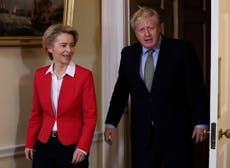Will Boris Johnson be able to charm his way to an EU trade deal?
The prime minister’s charisma has long been touted as one of his greatest assets. While it has won over voters, Sean O’Grady considers whether the PM has met his match in Ursula von der Leyen


After four and a half years of circuitous discussions, dozens of broken deadlines and a long but decidedly unproductive telephone call, can Boris Johnson’s face-to-face meeting with EU Commission president Ursula von der Leyen break the deadlock?
The decision by the British government to cancel some clauses in the Internal Market Bill and the Taxation Bill certainly helps. This move came as the parallel talks on the implementation of the Northern Ireland Protocol ended in (apparent) success. This was in fact unfinished business from the withdrawal agreement reached last year and ratified in principle this year. The EU believed that the British government’s behaviour suggested bad faith, while the British found the EU’s insistence on checks across the Irish Sea frustrating and impractical. At least for now those arguments seem to have been dissolved, and chicken sandwiches can be delivered to supermarkets in Strabane without provoking a diplomatic incident or a return of the Troubles.
There is also the pressure of time, the continuing Covid pandemic and the longstanding pleas of business people that are propelling the two sides to compromise.
But the question now is whether the personal chemistry between Johnson and von der Leyen can move things forward politically. This is by no means clear, and past meetings between Johnson and von der Leyen (and other European leaders) have had a mixed record.
The breakthrough last year on the “divorce” withdrawal agreement in October last year did follow such a dramatic last minute initiative; but in reality it merely involved the British travelling to Vienna and agreeing to (and reverting to) a previous EU Commission proposal for an Irish border. Johnson had previously claimed that was something no British prime minister could accept. At a chummy summit with his Irish counterpart Leo Varadkar at a country house hotel on the Wirral, however, Johnson’s pledges to Unionists and their Tory allies were quietly buried. The withdrawal agreement also left a great deal of devilish detail for future resolution, which now seems to be reaching completion.
On the other hand, more recent phone calls and video summit meetings haven’t made much difference, and, if the form book is followed, any breakthrough session on Wednesday or Friday this week, around another EU Summit, will probably involve wide British concessions, postponement of the most tricky issues and a blustering declaration of a “game, set and match” triumph by the British premier.
Apart from a liking for large families (Johnson has six children, von der Leyen seven), there is little these two leaders have in common. It’s true that she is a German Christian Democrat, roughly equivalent to a Conservative, but that merely makes her a committed European, as an article of faith and devoted to preserving the integrity of the single market, as you’d anyhow expect from the president of the EU Commission. The British prime minister, by contrast, is often described as the hardest Eurosceptic in the room these days - the intellectual influence of Dominic Cummings lives on. Where Johnson is scruffy, chaotic and a bit of a gambler, von der Leyen is perfectly coiffed, methodical and cautious. What’s more, she has less freedom of movement than her interlocutor - she has been given her red lines by Angela Merkel and Emmanuel Macron, and on the single market they will not and cannot shift, for fear of undermining the whole European project.
There is no doubt that personal meetings are better than phone calls because they allow for a freer, more natural exchange. Johnson may seek to charm von der Leyen, as he has others. In happier but still stressful times, British premiers have returned from summits with great deals – Margaret Thatcher on the EU budget rebate, John Major with the single currency opt out. But the dynamics and the mechanisms, with the UK outside the usual channels, are now much less favourable. Ever since the British snubbed the first moves towards European integration 70 years ago, the story has largely been one of misunderstandings, misjudgements of intentions and mistrust between both sides. The EU has consistently failed to comprehend British preoccupations with sovereignty, while the British have such an aversion to an ever closer European Union that they refused to believe they could possibly be serious about it. As prime specimens of two diametrically different political cultures, Johnson and von der Leyen could scarcely be further apart.

Join our commenting forum
Join thought-provoking conversations, follow other Independent readers and see their replies
Comments